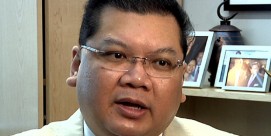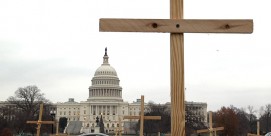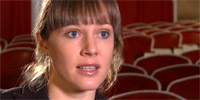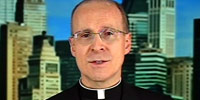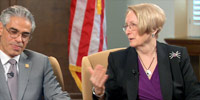In This Episode << SLIDE LEFT TO SEE ADDITIONAL SEGMENTS
J. Peter Pham
Read more of Kim Lawton’s interview about the Vatican and foreign policy with J. Peter Pham, director of the Nelson Institute for International and Public Affairs at James Madison University:
Q: Let’s talk about the double duties of the pope and the foreign policy-political aspect of his position.
A: Pope Benedict, like his predecessor and their predecessors before them, really [has] a dual-hatted position. He’s primarily, first and foremost, a religious leader, the spiritual head of Roman Catholics throughout the world. But he’s also the sovereign of the Holy See, which is recognized in the international community as a state. In fact, the UN recognizes it in the unusual category of state non-member of the United Nations, with the full right to participate in UN deliberations without a vote. And the Vatican currently maintains diplomatic relations with almost every country in the world, some exceptions being the People’s Republic of China, Saudi Arabia, but very few are those exceptions. And so the trip to the US really comes under two roles. Certainly he’ll be coming to the United States as the spiritual leader of Roman Catholics to meet with the American church and also other faith communities, but he’ll also be meeting with President Bush and government leaders here in Washington as a political leader as well, and most importantly, I think, for the trip, in New York at the United Nations as the not only spiritual head of the largest single faith community in the world, but also as a sovereign speaking to other sovereigns.
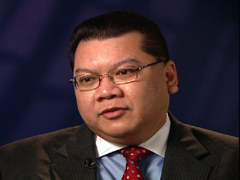 Q: How important do you consider his UN address to be?
Q: How important do you consider his UN address to be?
A: I think it’s important for several points. One is that although the pope is sovereign over a very small less than square mile plot of land in the middle of Rome, he also speaks as a spiritual leader, and so it’s the tension between those two roles that actually gives him a resilience on the international stage — that he doesn’t just speak for a geopolitical unit but also for a demographic within the world, and certainly within the era in which we live today, where there are tensions between large blocs of countries and the tensions are heightened at times by religious considerations, his voice is going to be very important, especially when he calls for peace and for greater dialogue between countries.
Q: Do people listen to him? Do countries and government leaders listen to what this pope has to say?
A: Well, I think the most famous quote was one by Joseph Stalin in the middle of the century when the French foreign minister asked him what the Holy See, the pope might object, and Stalin replied, “The pope, how many divisions has he got?” And I think history has sort of answered that, that although the divisions of the pope currently are about 120 Swiss guards, that’s not the relevance of, but really the relevance is the soft power that the papacy brings by being able to focus attention not just of Roman Catholics but Christians of all denominations and other people on issues that he chooses to highlight — that power to focus attention, to speak up, to be a point of dialogue or a point of contention.
Q: This pope has a very different personality than John Paul II, and on the international stage John Paul played an enormously influential role, in the fall of communism and other issues like that. How do you compare the two, and where do you see the differences?
A: Well, I think the two — there’s a discontinuity certainly in personality and style. There’s also a continuity in themes. For example, religious freedom was very important to John Paul II, and he spoke for freedom, first in the Soviet bloc but then throughout the world. Benedict is continuing it and also bringing it to a different level. He’s now talking about freedom not only to practice one’s beliefs, but freedom to change those beliefs, and he recently, although it caused a bit of controversy, gave a powerful symbol of that when he baptized, at the Easter Vigil at St. Peter’s Basilica, a very prominent former Muslim who’s the deputy editor of Corriere della Sera, one of Italy’s leading newspapers, and he publicly baptized him as a Roman Catholic.
Q: I want to talk more about that Muslim baptism in a minute, but first what are some of the foreign policy priorities you’ve seen in Benedict’s papacy?
A: Whereas John Paul, if you look at the entire pontificate, was very much outwardly oriented toward the church and the world, I think Benedict (part of it is personality, but I think part of it is also an agenda) is inwardly focused, that in order to engage the world Benedict’s view is the church has to be stronger from within. It has to solidify its own base, and so a lot of his attention has been focused turning inward within the church, matters within the Catholic Church, and also the Catholic Church’s relations with the Christian bodies with which it is closest — the Eastern Orthodox churches, the Anglican Communion, and then other groups. So his agenda in a way has been inwardly focused, but it’s an inward focus meant to strengthen it for that dialogue with the outside.
Q: Let’s go into relations with the Islamic world. They’ve been a little rocky for Benedict on a number of fronts. Let’s talk about the Regensburg speech first. How much of a challenge was that? How do you assess that speech and all the brouhaha that followed?
A: I think part of it was a surprise not just to Benedict but really to the Holy See, the responses that came up from some quarters of the Muslim world and all the unfortunate violence that occurred, the Italian nun [shot dead] in Somalia, etc. But Benedict — I think if you actually read the text of the speech it was very much his own persona as a university professor. This was a man who was a professional academic before he became a bishop and ultimately a cardinal and pope, and the speech itself he began by citing, “I recently read a critical edition” [and] named the editor, very much like a lecture that any university professor would give. Unfortunately, that critical volume that he cited had this incendiary quote in it, which was a historical quote, so in many respects I think the reaction was unanticipated and came as somewhat of a surprise. Now I would also assert at the same time, though, although the reaction to the quote was perhaps a surprise for Benedict and his closest collaborators, I don’t think that the use of the quote was necessarily unintended. I think the intention was, here is a story of the emperor who had been held prisoner as a hostage by his Muslim interlocutor, and he had engaged in this long dialogue with the man, and the two ended up talking about their respective faith traditions and agreeing to disagree at the end, and the emperor was let go and in fact lived to write this dialogue out of which the pope quoted from, and I think that was a not too subtle signal that perhaps, maybe there is something to be said that we’ve actually regressed in the six or seven centuries since that event occurred, because nowadays you get violent reactions for saying things, whereas this man was actually a prisoner in someone’s power. He said the things he said and was let go after they agreed to disagree. And so I think that was the intent of the address, to raise that point. Unfortunately, it was taken in a different sense, as if the pope himself had said those words rather than quoted them, and unfortunately we had the reaction to that.
Q: Should Benedict realize or anticipate these things more, that he’s no longer the university professor? Is there a difference in how things are perceived when you are the pope and you have that platform? Did he have some trouble recognizing that he was in a different position?
A: I think there was a bit of that. There was certainly a bit of getting used to the position. It’s a unique position. There’s really nothing that would train any man for that position, even if Benedict had been close by John Paul’s side all these years. That being said, however, I think Benedict was always a man of principle, and as a result he’s not going to let what we might call political considerations get in the way of speaking the truth. His motto for many years was “Cooperators with the Truth,” and so that’s his view of man’s vocation irrespective of one’s place in life — [it] is to cooperate with the truth, to let the truth stand on its own, and so in that sense he’s not going to mince words, and unfortunately, in the world in which we live, that often leads to consequences.
Q: How much damage was caused for relations between the West and the Islamic world?
A: On the one hand, a great deal of setback in dialogue certainly occurred. On the other hand, after the initial setback a number of moderate Muslim scholars actually wrote to the pope, 138 of them, and said, “Well, we have some differences clearly, but now that they’re highlighted maybe we should engage in a dialogue,” and so a process of dialogue has begun. So sometimes it’s good in any sort of relationship to lay everything out on the table and proceed from there. The first few moments may be awkward, but hopefully beyond that one can at least move on to a greater dialogue. Now, whether that dialogue takes place, under what circumstances — that we will remain to see.
Q: You mentioned the baptism of Magdi Allam, editor at Corriere della Sera newspaper, on Easter weekend. Was that an example of how the pope’s dual roles are sometimes in tension with one another? This was a religious act, a baptism, yet it had political consequences.
A: I for one don’t think that the public, prominent nature of that baptism was at all an accident in the sense that if the baptism was to occur, it could have occurred anywhere. The parish priest could have done it very quietly, discreetly. But I think the pope chose to do it himself and highlight it to emphasize the principle of religious freedom. Religious freedom cuts both ways. It’s not just freedom to practice one’s faith, but also freedom to change it, and in this case, the Corriere della Sera editor chose to change his faith and in fact adopted a new name, Christiano, Christian, as his new first name, and I think that’s part of the emphasis — that freedom of religion really means freedom of religion for everyone. Just as some Christians in the West or people of no faith choose to embrace Islam because that’s where they find spiritual fulfillment, then Muslims are also free to change their faith which is a principle that is not admitted in Islamic law, and I think it was a willful and intended challenge to that — that universal rights including religious freedom apply to everyone.
Q: What does it say that this pope worked that into this particular setting?
A: I think it is another indication of the man and his stand on principle. One can agree or disagree. I don’t agree about everything he says, and I doubt if many of his closest collaborators necessarily agree with everything, but he will stand on principle. He’s always done that throughout his career. He’s maintained friendships that would have not been considered helpful to one’s career because that was a matter of principle, and I think this was a principle in which he believes very strongly, in the right of the individual to have liberty in their faith and the expressions that they choose to adapt for that faith, and he chose to, if you will, highlight that very prominently on the night which in the Christian liturgical tradition is the most important and solemn night, the Paschal vigil, to use that as an occasion for this man’s expression of that and his endorsement of his right to do so.
Q: Let’s talk about some of the specific areas of the world that have been tension points for the Vatican. China is one of the few places where there are no diplomatic relations. How has Benedict been trying to work through that?
A: A year ago, Pope Benedict issued a letter to the Catholics of China, and in the letter he revoked a number of the special provisions that Pope Pius XII, more than 50 years ago, had put in place for the Chinese church. The clear signal being sent from Rome to the church in China was that there needs to be a reconciliation between the underground church and the official, state-recognized church, that there’s enough room for both sides to move on that. And by revoking the special provisions, it encourages that because now the underground church will no longer be consecrating bishops without the authorization directly of the Holy See, and the Holy See has been moving to quietly recognize bishops that were consecrated by the patriotic church, and the government knows this. So in a way there’s a certain movement. For a number of years already, the Vatican’s embassy on Taiwan with the Republic of China has been downgraded to the level of a charge d’affaires without a full papal nuncio, an ambassador, posted there. So I wouldn’t be surprised if in the next few years we didn’t see some sort of explicit accord between the Holy See and China and the establishment of a papal nunciature in Beijing.
Q: How significant would that be if it were to happen?
A: This would mean that the Holy See has diplomatic relations on an ambassadorial level with all 5 permanent members of the UN Security Council. It would leave as outlyers countries without diplomatic relations with the Holy See, being Saudi Arabia and a few small states here and there. So it certainly would enhance the Holy See’s diplomatic position. It would also enable the church to communicate openly and less through back channels with the large Christian community, which no one knows quite the number, but estimates are upwards of 15 million Catholics throughout China, and a new scope for action there. And so it would be a great impulse for the life of the church in China as well, so I think it would be a major and historic step.
Q: What about Iraq? Both John Paul II and Benedict opposed the U.S. invasion. How controversial an issue is that still?
A: Although Benedict will stand by the Holy See’s diplomatic position that the invasion of Iraq did not meet the norms of international law and John Paul’s interpretation that it did not meet the requirements of the just war doctrine, I think Benedict’s emphasis on Iraq is a different one, because his concerns are not necessarily war or peace. War has occurred, conflict is going on. Although one can pray and work for peace, that’s not his primary concern. His primary concern is the fate of Christians in Iraq. Iraq did have a large Christian community — both of several Catholic Eastern Rites, primarily the Chaldean Church, but also of Orthodox churches like the Assyrian Church of the East in Iraq — and Christians have suffered tremendously. The Chaldean Catholic Archbishop of Mosul, for example, was brutally killed just over a month ago. Christians are leaving Iraq in huge numbers. This is a community that’s been there since the time of the apostles, and so I think Benedict’s concern now is the survival of Christianity in this ancient land and the fate of those Christians who are now refugees, undocumented persons scattered throughout the Middle East and around the world.
Q: And he has similar concerns in the Middle East for Israel, the Palestinians, Christians in the Holy Land?
A: Yes, the Christian community there is shrinking, and I think the Christian presence in the area will be a concern not only of this pope but, really, of the Holy See. Now there is a change that’s going to come in Jerusalem, forthcoming, when Michel Sabah, the Latin Patriarch of Jerusalem, the first Palestinian to hold that position, is due to retire and will be succeeded actually by a Jordanian, which will be a very interesting dynamic that will be introduced into that.
Q: How much truth is there to the image that within the Holy See there is a sophisticated diplomatic corps with envoys going out to all these areas of conflict?
A: Actually, the diplomatic service of the Holy See is very small. Most people are surprised at how small it is. In most countries there is an apostolic nuncio, the Vatican equivalent of an ambassador, who is usually at the rank of an archbishop, and then perhaps one or two middle or low-ranking diplomats working under. So it’s a very small diplomatic mission. However, in many countries they often are exceptionally well-informed because their connections — they like the pope are dual-hatted. Not only are they there as diplomatic representatives; they’re also there as religious representatives of the pope and therefore have close contacts with the local church, and the local church is often, in many countries, the closest to the people, and so their sources of information are often much better than that of, say, an embassy of a large Western country where for security reason most of the diplomats are essentially living in a fortress. So they don’t have the full program of action, the capabilities of what we would consider a modern embassy. On the other hand, they do have the contacts and that human intelligence, not in the security sense of intelligence, but in the sense of knowledge of culture and terrain.
Q: The Vatican Secretary of State, Cardinal Bertone, was in Cuba when Fidel Castro stepped down. The envoys are often strategically placed and have great influence.
A: Yes, and also Pope Benedict, because he doesn’t travel as much as Pope John Paul II, has used his secretary of state in a far wider scope, giving him travel. Cardinal Bertone, the Secretary of State, who used to work for Cardinal Ratzinger and the Congregation of the Doctrine of the Faith, has traveled most recently to the Caucasus, to Azerbaijan and Armenia, both countries that are on the verge of possibly reopening another conflict. And so certainly [Benedict] has not just the diplomats in place but also officials he regularly sends out to these places that don’t get that attention, perhaps, from other world leaders.
Q: How important is it that the Vatican has this international role, that there is this voice of the Church at this level of international relations?
A: I think it’s very important, because it enables not just the voice of Catholicism to be heard but also just simply the voice of a different set of values, a different calculus, so that when a papal envoy speaks up at the United Nations, for example, it won’t be the calculus — the Vatican has no products it needs to sell, it has no imports or exports that — really, you know, minor things like water and electricity are supplied by Italy, so its concerns are not those of your typical nation-state, and so it can reflect greater questions and even if its positions are not the one ultimately adapted, at least it injects into the discussion the idea that there are issues other than the raw material ones that are often the “metal” that diplomats work with. And even if diplomats reject the Holy See’s position, which they often do on a number of issues, at least it gets them thinking that perhaps they will look to their own faith traditions, or perhaps they’ll look to their own ethical systems, that there is another calculus involved other than the strict material calculus of power, security, and influence.
Q: We’ve talked a lot about geopolitical issues, issues of war and peace. But on the international level the Vatican has also been a strong voice for other issues — family, opposition to abortion, bioethical issues.
A: Yes, and I think one of the interesting things is it’s because of the church’s strong position on the sanctity of the family and the value of the family that, for example, the issue of immigration, not just in Europe but, I think, will play out here in America. When the pope talks about the family he’ll certainly use Spanish, for example, in the two public Masses that he plans to celebrate in Washington and New York, and he’ll talk about family and family unification, and the Church has often spoken, and Benedict himself has spoken up, comparing the lot of many immigrants to that of Jesus, Mary, and Joseph in exile in Egypt, as he did most recently just a couple months ago. So I think that’s going to inject another dimension into our own political sphere, and I think that’s the other important thing to keep in mind when you talk about the international influence of the Holy See. It’s not just that international, multilateral level of the United Nations, or at the level of bilateral diplomatic relations; it’s also the fact that the pope is a spiritual leader who speaks. His flock doesn’t necessarily always respond to what he has to say or agree with it, but at times they do, and that, in many democratic countries, represents a considerable voting bloc.

